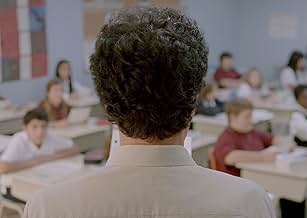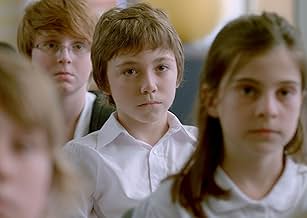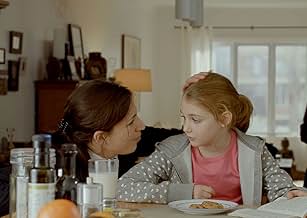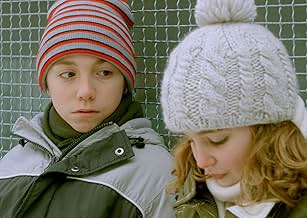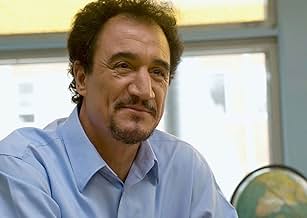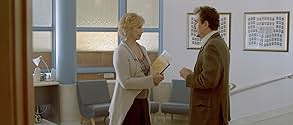An einer staatlichen Grundschule in Montreal wird ein algerischer Einwanderer als Ersatz für eine beliebte Lehrerin eingestellt, die in ihrem Klassenzimmer Selbstmord begangen hat. Während e... Alles lesenAn einer staatlichen Grundschule in Montreal wird ein algerischer Einwanderer als Ersatz für eine beliebte Lehrerin eingestellt, die in ihrem Klassenzimmer Selbstmord begangen hat. Während er versucht, seinen Schülerinnen und Schülern bei der Bewältigung ihrer Trauer zu helfen, w... Alles lesenAn einer staatlichen Grundschule in Montreal wird ein algerischer Einwanderer als Ersatz für eine beliebte Lehrerin eingestellt, die in ihrem Klassenzimmer Selbstmord begangen hat. Während er versucht, seinen Schülerinnen und Schülern bei der Bewältigung ihrer Trauer zu helfen, wird deutlich, welchen Verlust er unlängst selbst erlitten hat.
- Regie
- Drehbuch
- Hauptbesetzung
- Für 1 Oscar nominiert
- 30 Gewinne & 14 Nominierungen insgesamt
- Bachir Lazhar
- (as Fellag)
- Psychologue
- (as Nico Lagarde)
Empfohlene Bewertungen
Mohammd Fellag, an Algerian comedian, writer and humorist, portrays Monsieur Lazhar, and is surrounded by an exceptional cast of juvenile actors, led by Sophie Nelisse and Emilien Neron. The performances in this film are uniformly superb which, given the subject matter, is quite an accomplishment (particularly for the young actors portraying the classmates.)
Lazhar's attempts to deal with his students' grief, their cultural and educational differences, the rigid requirements of an educational system, and his own difficulties and loss all culminate in a final scene of incredible power and emotion - the power of one person to connect with another, the power of one act to convey incredible meaning.
"Monsieur Lazhar" is worthy of the honors it has received and worth a trip to the theatre.
www.worstshowontheweb.com
Fellag's performance as the title character is note perfect and gigantic. The children are astonishing and the final scene, the final moment will crush even the most stoic viewer's resolve not to weep.
I am only half correct to say that this movie deals with the healing process, because while it seems to be that way, observers will realize that it is not quite possible to heal the wounds of all parties, due to bureaucracy, conflicts and cultural differences. And it is not possible to pretend that nothing has happened either. What I find fascinating about this film is that it chose not to be too ambitious in finding a good conclusion, but introduces all the elements of restraint and helplessness by the characters.
However, the movie offered surprises especially in the development of certain characters. Even though I disagreed with some of the support methods carried out (the movie sometimes forget these kids were below 12 years old) and I would have hoped to see more positive aftermath from the movie, the ending was very satisfying, when Lazhar, given the compromising situation, decides to give his classroom something that their previous teacher failed to do.
The film opens with two school children discovering a favorite, but troubled, teacher who has hung herself in her classroom while her students are at recess. Psychologists are brought in to help the students cope with the emotional intensity of such a tragedy, and then later a Mr. Bachir Lazhar, an Algerian immigrant, presents himself to the principal as a suitable replacement for the suicide victim's class telling her how he's followed the school's trauma in the newspapers and he's available to help. Does he need the work (we find out his legal status is uncertain and he's in danger of being deported) or is some unconscious empathetic force driving him toward working with these students since he seems to understand their pain? The school authorities prefer to move on from the tragic event while Mr. Lazhar can sense after a number of months that some of his students are dwelling on their former teacher's act and her reasons for doing so; he encourages them to talk in class about their feelings and for this he is rebuked. We eventually discover the horrific tragedy surrounding his own family and why he's fled to Canada, and from this we can understand and appreciate his empathy for his students and his understanding of their emotional plight ("why did she do it in her own classroom during school?"). The film has many touching moments as this strange Algerian immigrant explains the "unexplainable" to his students and they in turn seem to provide him with an emotional outlet, and a purpose, to counter his own suffering.
Some reviewers have questioned the film's seeming lack of total emotional resolution, but life can be open-ended. Will these children completely heal (as much as they can) and will Mr. Lazhar's half-year encounter with these kindred souls give him the emotional basis for sustaining a meaningful life in a foreign environment? We don't really know, but some of the signs that the film depicts seem to be favorable. A very worthy film from Canada!
Wusstest du schon
- WissenswertesBased on the stage play Bashir Lazhar by Evelyne de la Chenelière. The playwright appears in the movie as Alice's mother.
- VerbindungenFeatured in The 84th Annual Academy Awards (2012)
Top-Auswahl
- How long is Monsieur Lazhar?Powered by Alexa
Details
- Erscheinungsdatum
- Herkunftsland
- Offizieller Standort
- Sprachen
- Auch bekannt als
- Quý Ông Lazhar
- Drehorte
- Produktionsfirmen
- Weitere beteiligte Unternehmen bei IMDbPro anzeigen
Box Office
- Bruttoertrag in den USA und Kanada
- 2.009.517 $
- Eröffnungswochenende in den USA und in Kanada
- 112.190 $
- 15. Apr. 2012
- Weltweiter Bruttoertrag
- 9.074.711 $
- Laufzeit1 Stunde 35 Minuten
- Farbe
- Sound-Mix
- Seitenverhältnis
- 2.35 : 1
Zu dieser Seite beitragen



